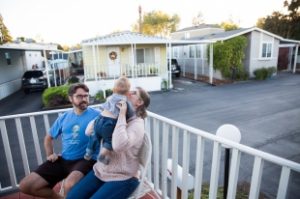Rental committee could expand Measure V protections

The Bornmann family at their home at the Santiago Villa mobile home park. In recent months, park residents have spearheaded a campaign to extend tenant protections to Mountain View’s sizable population of mobile-home residents.
[ED. NOTE: Judy Pavlick, interviewed in this article, is a member of the GSMOL Legislative Action Team (LAT) Committee.]
Barely a year old, Mountain View’s experiment with rent control has already faced a withering gauntlet of controversy and legal scuffles. Now it’s being primed for a dramatic expansion.
On Dec. 4, the city’s Rental Housing Commission is scheduled to consider expanding the Mountain View’s restrictions covering apartment rents to encompass the city’s six mobile home parks. The proposal could bring an estimated 1,100 more homes under the aegis of the city’s new tenant protections.
The upcoming hearing comes after months of organized efforts by residents mainly from the Santiago Villa mobile home park to press city officials to expand the law. Like apartments, mobile home parks were once an affordable housing alternative, but that has been changing as park owners have begun notching up rents or leasing out furnished units for a premium.
According to residents, the owners of Santiago Villa have made clear that their plan is to eventually push rents across the park to $2,200 per month, a rate that some say would make it the most expensive mobile home community in the country. This is a looming fear for many longtime residents, especially seniors living on fixed incomes, said Trey Bornmann, chairman of the newly formed Mountain View Mobile Home Alliance.
“We’re trying to make it so that people can plan their lives,” said Bornmann, who lives at Santiago Villa. “Right now our owner is using dirty tactics, jacking up the space rents and trying to turn this into a rental mobile home park.”
Santiago Villa management did not respond to requests for comment.
Mobile home parks operate differently than other types of housing. Typically, a prospective resident must purchase a mobile home, often by taking out a mortgage. The new homeowner must then pay a monthly rent for facilities, maintenance and land provided by the park management. Despite the name, mobile homes are extremely difficult to relocate, so homeowners are basically locked in with little choice but to pay whatever rent they’re being charged.
For years, Santiago Villa residents have been crying foul, saying their homes have plummeted in value as a direct result of the park’s rising rents. Many residents point to a common rule of thumb in the industry: every $100 in extra space rent means their home’s sale value has dropped by $10,000.
At least 100 cities in California have some form of rent control ordinances specifically for mobile homes. An ordinance in San Jose caps space-rent increases to 75 percent of the Consumer Price Index. Just last month, the city of Vallejo adopted a similar measure.
Sunnyvale, with its 12 mobile home parks, is also facing growing pressure to impose some price controls. A couple years ago, the Carlyle Group, a global private equity firm, paid $151 million to acquired Plaza Del Rey, one of the city’s largest mobile home parks. Ever since, the park’s residents have been hammered by the steepest rent increases in the park’s history, said Judy Pavlick, founder of the Sunnyvale Mobile Home Park Alliance. In negotiation meetings, Carlyle executives told Pavlick they were watching nearby markets to see what prices Sunnyvale could bear. She is now spearheading efforts to get a mobile home rent control ordinance on the ballot of an upcoming election.
“We’ve gone to the Sunnyvale City Council, and it’s clear they’re not interested in helping us. They don’t believe in rent control,” she said.
In the buildup to last year’s election, rent control proponents made a calculated political move, hinting that Measure V could be applied to mobile homes. The language in the measure deliberately referred to covered housing as “rental units,” not apartments, to leave this possibility open.
Yet pretty much everyone seems to agree that expanding Measure V to include mobile homes would be fraught with challenges. Mobile homes are covered under a separate section of California law with their own set of special rules, exemptions — and potential legal risks.
At the Dec. 4 meeting, lawyers retained by the city from the firm Goldfarb & Lipman will deliver a legal analysis of what provisions of Measure V could be applied to mobile home parks. After weighing that analysis, the Rental Housing Committee will decide whether to move forward to study expanding rent control, according to city staff.
Politically, it remains an open question whether the city’s Rental Housing Committee or the City Council would support expanding rent control to mobile homes, even in concept.
“It’s a complex, multifaceted issue, so it’s really hard for me to say how this will pan out,” said Evan Ortiz, a Measure V campaign organizer who now sits on the Rental Housing Committee. “I wonder what the most effective policy decision would be, and it might not be to expand Measure V.”
If city officials decline to take action, Bornmann and other mobile home residents say they intend to begin campaigning for a separate ordinance, possibly through a ballot measure.




